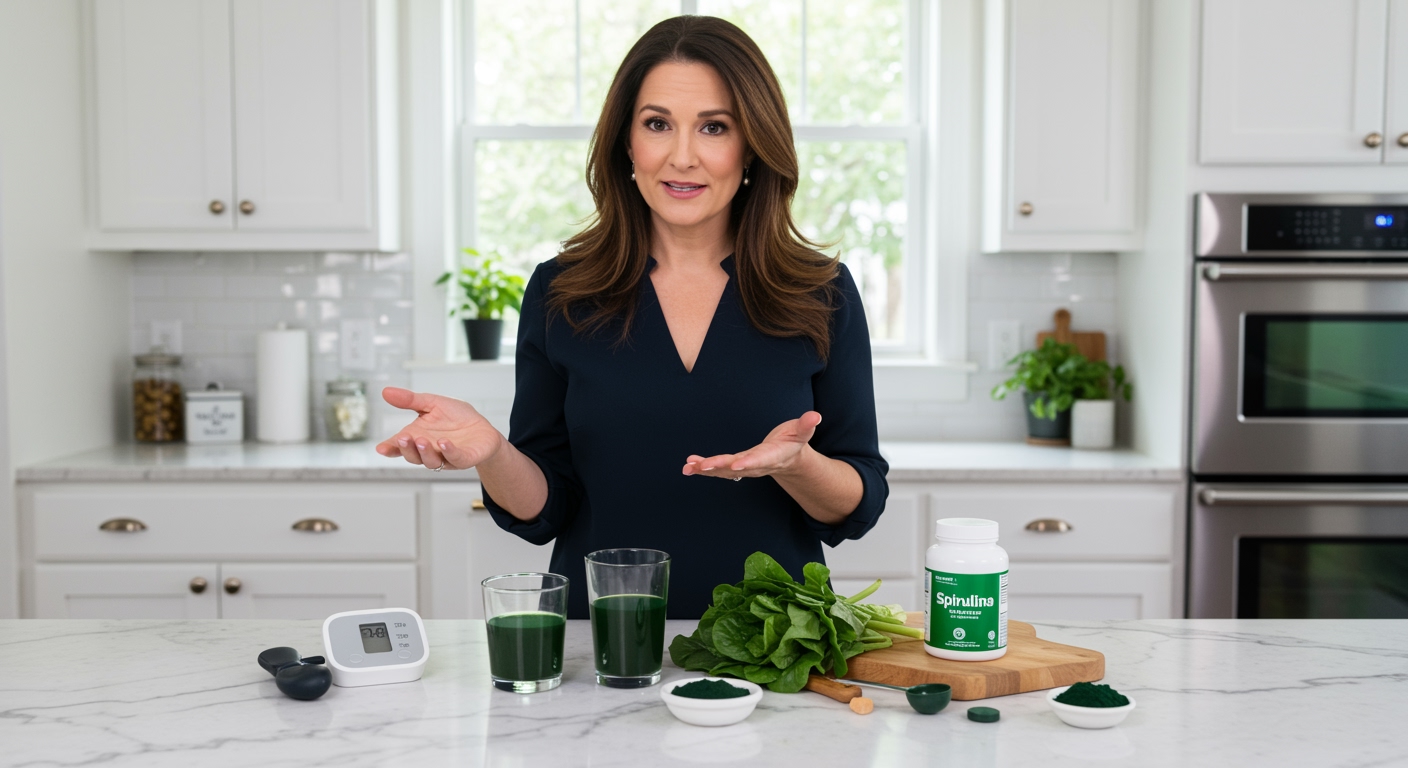✪ Key Highlight: Spirulina supplementation reduces blood pressure by 5.3 mmHg systolic and 3.6 mmHg diastolic in 12 weeks.
Introduction
Blood pressure medications fill pharmacy shelves while millions search for natural alternatives that actually work.
New research from the Journal of Human Nutrition and Dietetics reveals that spirulina supplementation significantly reduces both systolic and diastolic blood pressure in just 12 weeks.
Hi, I’m Abdur, your nutrition coach and today I’m going to analyze this groundbreaking research on spirulina’s powerful effects on cardiovascular health.
What Makes Spirulina So Effective For Blood Pressure?
Researchers analyzed data from 29 randomized controlled trials involving over 1,500 participants to understand spirulina’s cardiovascular benefits.
The study found that consuming more than 3 grams daily of whole spirulina for at least 12 weeks produced significant blood pressure reductions.
Spirulina outperformed other algae types like Chlorella by nearly double the effectiveness in lowering blood pressure measurements.
The blue-green algae contains unique compounds including peptides, potassium, antioxidants, omega-3 fatty acids, and polyphenols that work together synergistically.
These bioactive compounds improve blood vessel flexibility, reduce inflammation, and help your kidneys eliminate excess sodium more efficiently.
Whole spirulina showed superior results compared to spirulina extracts, suggesting that all nutrients working together create the therapeutic effect.
The research indicates that spirulina’s cardiovascular benefits stem from its ability to reduce oxidative stress and improve endothelial function in blood vessels.
✪ Fact: Spirulina contains more protein per gram than beef and provides complete amino acid profiles.
Who Benefits Most From Spirulina Supplementation?
The research revealed that certain groups experience enhanced benefits from spirulina supplementation for blood pressure control.
People over 50 years old showed the most dramatic improvements in both systolic and diastolic blood pressure measurements.
Overweight and obese individuals experienced significant cardiovascular improvements, with some studies showing 2.6 mmHg reductions in diastolic pressure.
Participants with existing hypertension or elevated blood pressure saw the most pronounced benefits compared to those with normal readings.
The research from Frontiers in Nutrition specifically focused on overweight adults and found that even a 2 mmHg drop reduces hypertension prevalence by 17 percent.
People with metabolic disorders including diabetes, high cholesterol, and insulin resistance showed improved cardiovascular risk profiles with spirulina supplementation.
The benefits became more pronounced with longer supplementation periods, suggesting that consistency and duration matter for optimal results.
✪ Pro Tip: Combine spirulina with regular exercise for enhanced cholesterol and cardiovascular benefits.
What Dosage And Duration Work Best?
The optimal spirulina dosage for blood pressure benefits requires more than 3 grams daily according to multiple research studies.
Participants needed to maintain supplementation for at least 12 weeks to achieve significant systolic and diastolic pressure reductions.
Studies lasting longer than 8 weeks showed progressively better results, indicating that spirulina’s cardiovascular benefits improve with time.
The research suggests that whole spirulina powder or tablets work better than processed extracts for blood pressure management.
Most studies used dosages ranging from 3 to 10 grams daily, with higher doses showing enhanced benefits in people with elevated blood pressure.
Researchers found no significant safety concerns with spirulina supplementation at recommended doses for several months of continuous use.
The timing of spirulina consumption did not significantly impact results, allowing flexibility in when people take their daily dose.
✪ Note: Always consult your healthcare provider before starting spirulina if you take blood pressure medications.
How Does Spirulina Compare To Blood Pressure Medications?
Spirulina’s blood pressure reduction of 5.3 mmHg systolic compares favorably to some prescription medications without side effects.
Many blood pressure medications produce similar reductions but often come with unwanted side effects like dizziness, fatigue, or digestive issues.
The research emphasizes that spirulina should complement, not replace, prescribed medications for people with moderate to severe hypertension.
Spirulina works through natural mechanisms including improved blood vessel function, reduced inflammation, and better sodium-potassium balance.
Unlike medications that target single pathways, spirulina addresses multiple cardiovascular risk factors simultaneously including cholesterol, inflammation, and oxidative stress.
The algae provides additional nutritional benefits including protein, vitamins, minerals, and antioxidants that support overall health.
Researchers suggest spirulina may serve as valuable adjunctive therapy alongside lifestyle modifications and medical treatment when appropriate.
✪ Fact: Spirulina has been safely consumed for centuries by communities around Lake Chad in Africa.
The Bottom Line
The research clearly demonstrates that spirulina supplementation offers significant cardiovascular benefits for people with elevated blood pressure or metabolic risk factors.
Nature provides powerful solutions when we know where to look and how much to take for optimal results.
I would love to hear your thoughts about spirulina supplementation or any questions you might have about incorporating this superfood into your daily routine.
References
At NutritionCrown, we use quality and credible sources to ensure our content is accurate and trustworthy. Below are the sources referenced in creating this article:
- PubMed: Effects of edible microalgae on blood pressure: a systematic review and meta-analysis
- PubMed: Effects of Spirulina supplementation on blood pressure: a systematic review and meta-analysis
- Frontiers in Nutrition: Effects of Spirulina supplementation on cardiometabolic risk factors in overweight and obese adults
- News Medical: Why Spirulina could be a helpful natural option for lowering blood pressure





